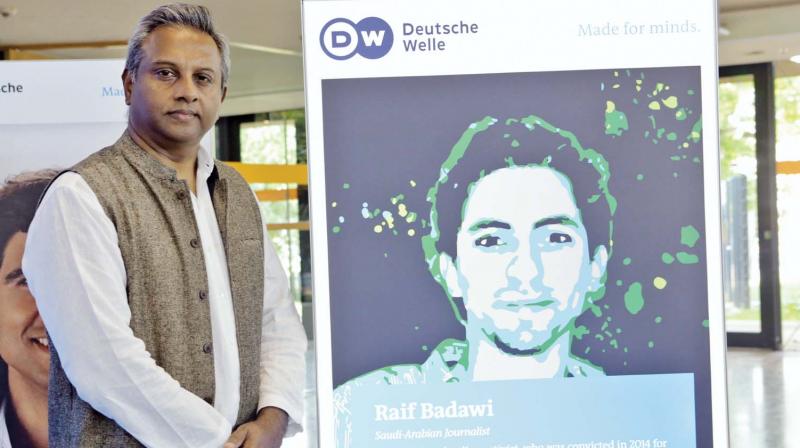Freedom of the press

He has a reputation for calling a spade a bulldozer. He is as abrasive as sandpaper. And yet there is no denying he puts across his point of view with the forthrightness of a JCB clawing the earth. Meet Salil Shetty, Secretary General of Amnesty International, who stole a session of open discussion by a panel in the splendidly put together Global Media Forum of Deutsche Welle, Germany's preeminent broadcaster, in Bonn last week. Sounds of controversy rang out the most from this lively panel of eminent speakers and spokespersons who had a DW anchor of African descent as moderator and Carmen Perez, national co-chair of the U.S. "Women's March" initiative, as a participant.
What Shetty said made perfect sense. His take on the current global political scene was undeniably honest, even if frightfully provocative. He spoke of the pent-up anger in people that was finding a way to express itself in some 96 countries in which there have been demonstrations just this year. This sense of anger was what Shetty seized upon to put the point of view across of his famous watchdog group, which is being hounded out of many countries because Amnesty International has this preponderantly antiestablishment view.
It is not as if the Amnesty spokesperson did not shower praise where it is due, as at Angela Merkel who took the decision on behalf of Germany to take in a million more refugees from a wave of migration caused by the wars that the bigger powers run in West Asia and North Africa. Merkel has done this at considerable political cost to herself, her party and alliance, but then she has shown to Europe and the West how a brave moral high ground can be taken it comes to putting out one's hand to offer succour and solace to the victims of someone else's interventionist policies..
Shetty even had a liking for the host nation of the 10th edition of the most modern media conference to the extent of making what appears to be a logical call for a permanent place on the United Nations Security Council for Germany. Such a move would also recognise and accommodate Germany's willingness to be a world leader at this point of time in contemporary history. Even so, it did not preclude his stating a fundamental view of geopolitics about the rationale of the G8 deciding for and on behalf of the whole world.
A simple reminder that China, India and the rest of South Asia accounted for 70 per cent of the world's seven billion people and how come leaders of 8 nations, or for that matter 20, are taking the decisions that impact all the people. The distinct lack of true leaders is the crux of the world's problems at the moment and what he would personally recommend is a global movement driven by the people like, say, the one in Gambia where the youth brought about the change by just uniting.
His dark foreboding that one day Saudi Arabia would implode may not have gone down well with the audience. Doomsday scenarios are not rare these days, but no one wishes ever to make a prognostication because to live to see it possibly come true is too fearful a prospect. But then Shetty is different because he and possibly his organisation are convinced that Saudi Arabia is the fount of all evil and at the moment is the villain of the piece in the region for "bombing the !@#$ out of Yemen". The world leaders are keeping quiet because the Saudi Riyals keep their armament industry going. Western double standards apply as much to Merkel as everyone else, he says while pointing out the curious silence over the human rights violations in Saudi Arabia and Bahrain.
It is not generally up to watchdogs to suggest remedies as well because they are the ones too busy "barking" at the violations. Even there, Shetty has a part solution to offer. He says withdraw the power of the super nations to veto UN action at least when it comes to acting on human rights violations. Give up the UN veto for the greater good of the world, he pleads. If there are violations in Aleppo and Northeastern Nigeria, don't allow veto power to run roughshod, make the countries accept there is a problem and act on a solution. This is no insane call of rabid activists.
Even India came in for a fair bit of flak for toying with the freedom of the press. On a complaint by a journalist who pointed out how some like him were painted as 'jihaids' for pointing out human rights violations or casting light on the cow vigilantes, the AI representative said this may be treated as a "badge of honour'.
The message was clear enough. It is the leaders of countries who are forcing us to go astray and we are unable to see it because there are people willing to go along with the flow - out of greed or sheer fear. The world is badly led and what do we do about it? These may be unusual views said with an edge of bitterness. Such an opinion is not necessarily wrong because only very few people with a quintessential antiestablishment viewpoint hold it.
The idea of the Deutsche Welle global media conference seemed to be to wake us all up to consider every point of view there is. And Amnesty International's view served to remind us that all is not well with the world and the media has to do its job to keep telling the people of all that is wrong in the hope that we will right some of it at least, at some point in time.

